Related Research Articles

Joanna Russ was an American writer, academic and feminist. She is the author of a number of works of science fiction, fantasy and feminist literary criticism such as How to Suppress Women's Writing, as well as a contemporary novel, On Strike Against God, and one children's book, Kittatinny. She is best known for The Female Man, a novel combining utopian fiction and satire, and the story "When It Changed".
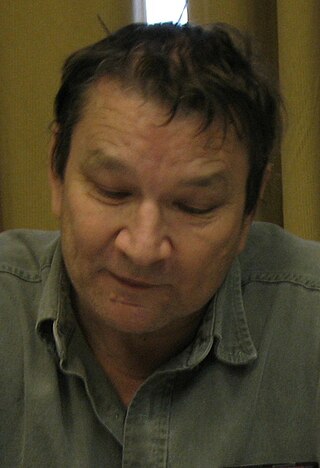
Howard Waldrop was an American science fiction author who worked primarily in short fiction. He received the World Fantasy Award for Life Achievement in 2021.

The Encyclopedia of Science Fiction (SFE) is an English language reference work on science fiction, first published in 1979. It has won the Hugo, Locus and British SF Awards. Two print editions appeared in 1979 and 1993. A third, continuously revised, edition was published online from 2011; a change of web host was announced as the launch of a fourth edition in 2021.

The Magazine of Fantasy & Science Fiction is a U.S. fantasy and science fiction magazine, first published in 1949 by Mystery House, a subsidiary of Lawrence Spivak's Mercury Press. Editors Anthony Boucher and J. Francis McComas had approached Spivak in the mid-1940s about creating a fantasy companion to Spivak's existing mystery title, Ellery Queen's Mystery Magazine. The first issue was titled The Magazine of Fantasy, but the decision was quickly made to include science fiction as well as fantasy, and the title was changed correspondingly with the second issue. F&SF was quite different in presentation from the existing science fiction magazines of the day, most of which were in pulp format: it had no interior illustrations, no letter column, and text in a single-column format, which in the opinion of science fiction historian Mike Ashley "set F&SF apart, giving it the air and authority of a superior magazine".
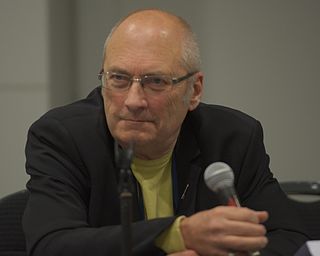
John Frederick Clute is a Canadian-born author and critic specializing in science fiction and fantasy literature who has lived in both England and the United States since 1969. He has been described as "an integral part of science fiction's history" and "perhaps the foremost reader-critic of science fiction in our time, and one of the best the genre has ever known." He was one of eight people who founded the English magazine Interzone in 1982.

Interzone is a British fantasy and science fiction magazine. Published since 1982, Interzone is the eighth-longest-running English language science fiction magazine in history, and the longest-running British science fiction (SF) magazine. Stories published in Interzone have been finalists for the Hugo Awards and have won a Nebula Award and numerous British Science Fiction Awards.
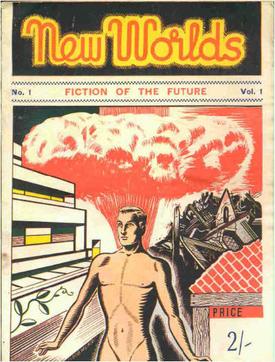
New Worlds was a British science fiction magazine that began in 1936 as a fanzine called Novae Terrae. John Carnell, who became Novae Terrae's editor in 1939, renamed it New Worlds that year. He was instrumental in turning it into a professional publication in 1946 and was the first editor of the new incarnation. It became the leading UK science fiction magazine; the period to 1960 has been described by science fiction historian Mike Ashley as the magazine's "Golden Age".
David Pringle is a Scottish science fiction editor and critic.

The Encyclopedia of Fantasy is a 1997 reference work covering fantasy fiction, edited by John Clute and John Grant. As of November 2012, the full text of The Encyclopedia of Fantasy is available online, as a companion to the online edition of The Encyclopedia of Science Fiction. Other than adding death dates, there are no plans to update the encyclopedia.
Edward Frederick James is a British scholar of medieval history and science fiction. He is Emeritus Professor of Medieval History at University College, Dublin. James received the Hugo Award for his non-fiction book The Cambridge Companion to Science Fiction, and the Pilgrim Award for lifetime contribution to SF and fantasy scholarship.
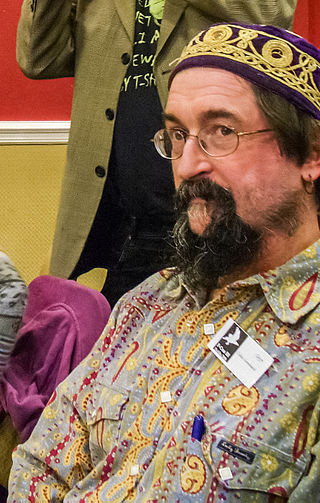
Colin Greenland is a British science fiction writer, whose first story won the second prize in a 1982 Faber & Faber competition. His best-known novel is Take Back Plenty (1990), winner of both major British science fiction awards, the 1990 British SF Association award and the 1991 Arthur C. Clarke Award, as well as being a nominee for the 1992 Philip K. Dick Award for the best original paperback published that year in the United States.

Mythago Wood is a fantasy novel by British writer Robert Holdstock, published in the United Kingdom in 1984. Mythago Wood is set in Herefordshire, England, in and around a stand of ancient woodland, known as Ryhope Wood. The story involves the internally estranged members of the Huxley family, particularly Stephen Huxley, and his experiences with the enigmatic forest and its magical inhabitants. The conception began as a short story written for the 1979 Milford Writer's Workshop; a novella of the same name appeared in the September 1981 edition of The Magazine of Fantasy & Science Fiction.
Andrew M. Butler is a British academic who teaches film, media and cultural studies at Canterbury Christ Church University. He is a former editor of Vector, the critical journal of the British Science Fiction Association, and was membership secretary of the Science Fiction Foundation. He is a former Arthur C. Clarke Award judge and is now a member of the Serendip Foundation which administers the award.
Richard Neil Barron was a science fiction bibliographer and scholar. His training was as a librarian. He is perhaps best known for his book Anatomy of Wonder: A Critical Guide to Science Fiction. He won the Pilgrim Award for Lifetime Achievement in the field of science fiction scholarship in 1982. He died on September 5, 2010, in Las Vegas, Nevada.

Farah Jane Mendlesohn is a British academic historian, writer on speculative fiction, and active member of science fiction fandom. Mendlesohn is best-known for their 2008 book Rhetorics of Fantasy, which classifies fantasy literature into four modes based on how the fantastic enters the story. Their work as editor includes the Cambridge Companions to science fiction and fantasy, collaborations with Edward James. The science fiction volume won a Hugo Award. Mendlesohn is also known for books on the history of fantasy, including Children's Fantasy Literature: An Introduction, co-written with Michael Levy. It was the first work to trace the genre's 500-year history and won the World Fantasy Award.
Science fiction studies is the common name for the academic discipline that studies and researches the history, culture, and works of science fiction and, more broadly, speculative fiction.

How to Suppress Women's Writing is a book by Joanna Russ, published in 1983. Written in the style of a sarcastic and irreverent guidebook, it explains how women are prevented from producing written works, not given credit when such works are produced, or dismissed or belittled for those contributions which they are acknowledged to have made. Although primarily focusing on texts written in English, the author also includes examples from non-English works and other media, like paintings. Citing authors and critics like Suzy McKee Charnas, Margaret Cavendish, and Vonda McIntyre, Russ aims to describe the systematic social forces that impede widespread recognition of the work of female authors.
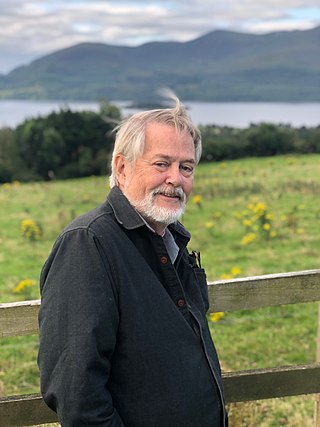
Gary K. Wolfe is an American science fiction editor, critic and biographer. He is an emeritus Professor of Humanities in Roosevelt University's Evelyn T. Stone College of Professional Studies.

Fantasy is a genre of fiction involving magical elements, as well as a work in this genre.
This is a timeline of science fiction as a literary tradition. While the date of the start of science fiction is debated, this list includes a range of Ancient, Medieval, and Renaissance-era precursors and proto-science fiction as well, as long as these examples include typical science fiction themes and topoi such as travel to outer space and encounter with alien life-forms.
References
- ↑ Grant, John; Tiner, Ron (1996). The Encyclopedia of Fantasy and Science Fiction Art Techniques. Titon Books. p. 163. ISBN 1-85286-702-7.
- ↑ Montegomerie, Lee. "War and/or Peace". Interzone. No. 11. p. 9.
- ↑ "Judith Clute". Thames-Side Print Studio Shop. Retrieved October 29, 2021.
- ↑ The Association of Illustrators: 10th Annual. Rotovision. 1985. p. 146. ISBN 2-88046-053-0.
- ↑ "Old Camden Town". London Walks. Retrieved October 29, 2021.
- ↑ Mallen, Sean (2018-10-13). Falling for London: A Cautionary Tale. Dundurn. p. 109. ISBN 978-1-4597-4196-6.
- 1 2 Jude, Dick (2002). Fantasy Art Masters: the best in fantasy and sf art worldwide. London: Collins. p. 38. ISBN 0-00-713747-8.
- ↑ Langford, David (2009-05-01). Starcombing. Wildside Press LLC. p. 21. ISBN 978-0-8095-7348-6.
- ↑ Curtis, David (2020). London's New Arts Labs and the 60's Avant Garde. John Libby Publishing. pp. 117, 118. ISBN 978-0-86196-748-3.
- ↑ Bailey, Hilary, ed. (1975). "Daddy's Girl". New Worlds. 9. ISBN 0-552-10022-6.
- ↑ Barnet, Paul, ed. (2002). The Paper Tiger Fantasy Art Gallery. Paper Tiger. p. 32. ISBN 1-85585-957-2.
- 1 2 Judith Clute's Tantalizing 37th Album. Beccon Publications. 2019. p. 1. ISBN 978-1-870824-65-1.
- ↑ Ashley, Mike (2020-02-29). Science-Fiction Rebels: the Story of the Science-Fiction Magazines from 1981 To 1990: The History of the Science-Fiction Magazine. Oxford University Press. pp. 132–133. ISBN 978-1-78962-171-6.
- ↑ Brazier, Paul (2003). "Still Turning Motifs Upside Down". Interzone. No. 188. pp. 34–36. ISSN 0264-3596.
- ↑ "A Short Film About John Bolton". IMDb. Retrieved November 4, 2021.
- ↑ Curtis, David (2020). London's New Arts Lab and 60s Avant Garde. John Libby Publishing. pp. Appendix 1, 155. ISBN 978-0-86196-748-3.
- ↑ "RAFT on RESONANCE 104.4 fm Episode 20". RAFT - A London Story. Retrieved November 11, 2021.
- ↑ Mendlesohn, Farah, ed. (2006). Polder: A Festschrift for John Clute and Judith Clute. Old Earth Books. p. 8. ISBN 1-882968-34-4.
- ↑ Mendlesohn, Farah, ed. (2006). Polder: A Festschrift for John Clute and Judith Clute. Old Earth Books. p. 56. ISBN 1-882968-34-4.
- ↑ "2010-2019". European Science Fiction Society. Retrieved November 11, 2021.
- ↑ Greenland, Colin (1983). The Entropy Exhibition: Michael Moorcock & The British 'New Wave' in Science Fiction. Routledge & Kegan Paul. ISBN 0-7100-9310-1.
- ↑ Russ, Joanna (1985). The Female Man. The Women's Press. ISBN 0-7043-3949-8.
- ↑ Russ, Joanna (1985). Extra(ordinary) People. The Woman's Press. ISBN 0-7043-3950-1.
- ↑ Russ, Joanna (1985). The Adventures of Alex. The Women's Press. ISBN 0-7043-3972-2.
- ↑ Russ, Joanna (1989). The Hidden Side of the Moon. The Women's Press. ISBN 0-7043-4185-9.
- ↑ Russ, Joanna (1989). We Who Are About To... The Women's Press. ISBN 0-7043-4085-2.
- ↑ "All Female Issue!". Interzone. No. 42. 1990. pp. 30–35. ISSN 0264-3596.
- ↑ Clute, John (1995). Look at the Evidence: Essays and Reviews. Liverpool Press. ISBN 0-85323-820-0.
- ↑ Kerman, Judith; Riggs, Don (2000). Uncommon Places: Poems of the Fantastic. Mayapple Press. ISBN 0-932412-17-3.
- ↑ Clute, John (2003). Scores: Reviews. Beccon Publications. ISBN 1-870824-48-2.
- ↑ Wolfe, Gary K. (2005). Reviews: 1992-1996. Beccon Publications. ISBN 1-870824-50-4.
- ↑ Hand, Elizabeith (2006). Chip Crockett's Christmas Carol. Beccon Publications. ISBN 1-870824-49-0.
- ↑ "Forever Peace. To Stop War. Poem by Joe Haldeman. Etchings by Judith Clute". Temporary Culture. Retrieved November 4, 2021.
- ↑ Clute, John (2009). Canary Fever: Reviews. Beccon Publications. ISBN 978-1-870824-57-6.
- ↑ Wolfe, Gary K. (2010). Reviews: 1997-2001. Beccon Publications. ISBN 978-1-870824-58-3.
- ↑ Wolfe, Gary K (2011). Sightings: Reviews 2002-2006. Beccon Publications. ISBN 978-1-870824-61-3.
- ↑ Clute, John (2011). Pardon This Intrusion: Fanstistka in the World Storm. Beccon Publications. ISBN 978-1-870824-60-6.
- ↑ Morgan, Cheryl (18 January 2011). "Issue #5". Salon Futura. Retrieved November 11, 2021.
- ↑ Clute, John (2014). Stay. Beccon Publications. ISBN 978-1-870824-63-7.
- ↑ "I Can Spin a Rainbow". Bandcamp. Retrieved November 11, 2021.
- ↑ Rudick, Nicole (July 18, 2019). "A Universe of One's Own". The New York Review of Books. 66 (12). Retrieved November 11, 2021.